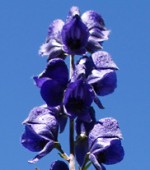 Also called wolfsbane and helmet flower, this herbaceous perennial is a member of the buttercup family, Ranunculaceae, that also includes columbine, hellebore, and delphinium. It is native and endemic to western and central Europe where it grows in moist areas in pastures and mountains. The common name, wolfsbane, comes from the use of the plant to produce a poison to kill wolves. The derivation of the generic name, Aconitum, is disputed but may come from a Greek word that refers to the invincibility of its poison.
Also called wolfsbane and helmet flower, this herbaceous perennial is a member of the buttercup family, Ranunculaceae, that also includes columbine, hellebore, and delphinium. It is native and endemic to western and central Europe where it grows in moist areas in pastures and mountains. The common name, wolfsbane, comes from the use of the plant to produce a poison to kill wolves. The derivation of the generic name, Aconitum, is disputed but may come from a Greek word that refers to the invincibility of its poison.
Description: Growing two to four feet tall from a tuberous taproot the plant has hairless dark green leaves two to four inches across that are so divided that they appear linear. The indigo blue to dark purple flowers are up to an inch long and appear in summer in terminal racemes up to eight inches long. They have an upper sepal that develops into a large helmet that resembles the hood of medieval monks, leading to the common name of monkshood and helmet flower. Plants grow best where nights are cool.
Poisonous Properties: Considered one of the moist poisonous garden plants, common monkshood contains alkaloids including aconitine and aconine, the former being the most significant toxin. All parts of the plant contain aconitine but the root most toxic especially before the plant flowers. Poisoning can occur by absorption through the skin or in wounds as well as by ingestion but the plant is very bitter making accidental poisonings rare. Symptoms from skin or wound contact begin with tingling at the point of absorption followed by numbness. Symptoms from ingesting the poison begin immediately and include burning, tingling, and numbness in the face, lips, mouth and throat with burning in the abdomen. Other symptoms include nausea, vomiting, diarrhea, excessive salivation, intense thirst, headache, dizziness, slow heart rate, difficulty breathing, confusion, delirium, paralysis, convulsions, coma, and death due to failure of the heart or respiratory center, although most victims recover within twenty-four hours.